The world of tattoos is as diverse as it is captivating. Among the myriad styles and designs available, Japanese tattoos stand out as a remarkable blend of artistry, cultural symbolism, and personal expression. A well-crafted Japanese sleeve tattoo is a sight to behold, an intricate narrative etched in skin, revealing stories of courage, life, death, love, and transformation.
A Journey through Time: The History of Japanese Tattoos
Japanese tattoos, or Irezumi, have a history that stretches back thousands of years. The earliest evidence of body art in Japan dates back to the Jomon period (c. 10,000 BC to 300 BC), with clay figurines found bearing painted or engraved tattoo-like markings.
During the Edo period (1603-1868), tattoo artistry truly flourished. Firefighters, laborers, and the ‘chivalrous commoners’ – a class known as ‘otokodate’ – wore tattoos as badges of bravery. However, the art form was not without its periods of stigma. For instance, during the Meiji era, tattoos were outlawed in a bid to modernize Japan and improve its international reputation.
Despite the ban, the art of Irezumi survived in the underworld, becoming a distinct part of Yakuza, Japanese organized crime syndicates. Today, the stigma around tattoos has lessened, though remnants remain. Irezumi has evolved into a celebrated art form, appreciated worldwide for its intricate designs and rich symbolism.
Unraveling the Enigma: Japanese Sleeve Tattoos
In Japanese tattoo culture, “sleeve” refers to a large tattoo or collection of smaller tattoos that cover a significant part of the arm, typically falling into three categories: full sleeve, half sleeve, and quarter sleeve. Full sleeve tattoos cover the entire arm, usually from the shoulder to the wrist. Half sleeve tattoos typically span from the shoulder to the elbow or from the elbow to the wrist, while quarter sleeves usually cover the area from the shoulder to the mid-upper arm.
Japanese sleeve tattoos are highly symbolic, often telling stories or conveying deep personal meanings. Most designs involve elements from nature, mythology, or traditional Japanese art and literature. The complex narratives and intricate designs require a significant time commitment, both in planning the design and in inking it onto the skin.
Striking Japanese Sleeve Tattoo Designs and Their Profound Meanings
Cherry Blossoms Design
Cherry blossoms, or ‘sakura’, symbolize life’s fleeting nature in Japanese culture. They serve as a reminder of the beauty and transience of life. A cherry blossom sleeve tattoo might represent an appreciation for life’s fleeting moments, or a personal loss the wearer has experienced.
Pink cherry blossoms on black background
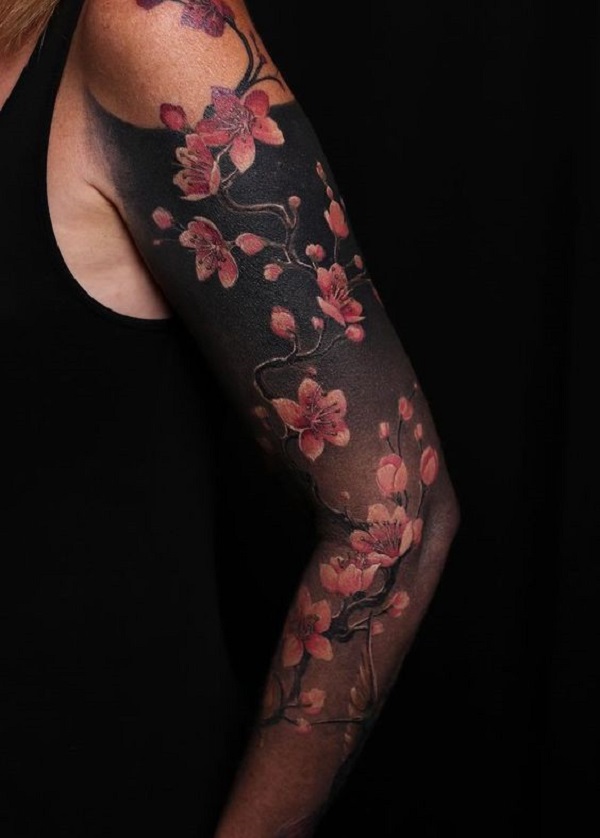
Cherry blossom and lotus
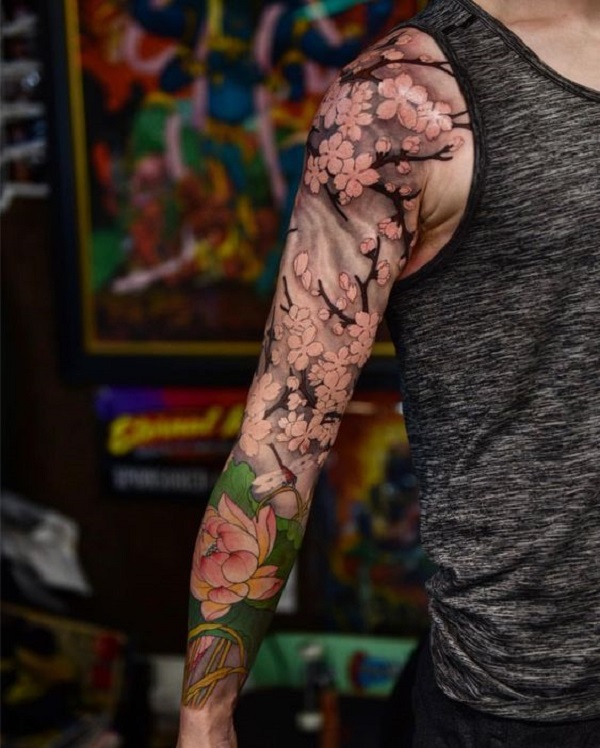
Dragon Design
Dragons hold a significant place in Japanese mythology. They symbolize wisdom, strength, and protection. A dragon sleeve tattoo may represent the wearer’s inner strength or their role as a protector.
Ryu and peony tattoo sleeve
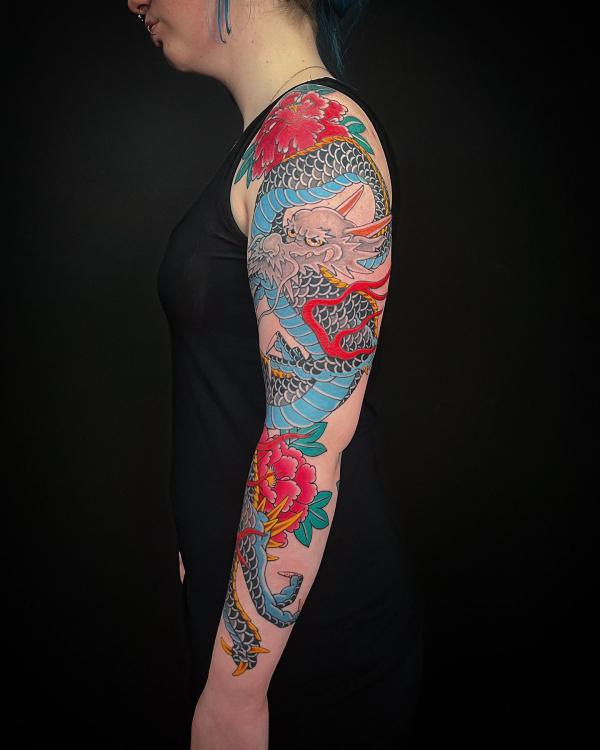
The most traditional form is the ‘Ryu’ tattoo. It typically depicts the dragon in a coiled position, highlighting the creature’s long, serpent-like body and clawed feet. The Ryu tattoo is often accompanied by other elements like clouds or waves, emphasizing the dragon’s connection with the natural world.
Japanese dragon and cherry blossom sleeve tattoo
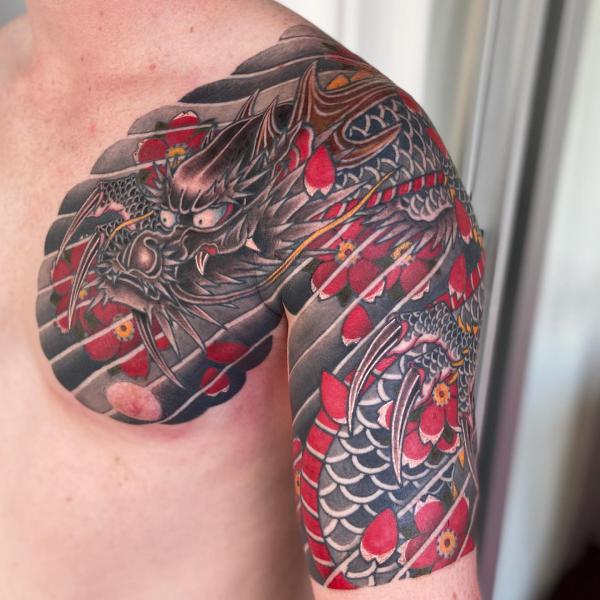
Pairing a Japanese dragon with cherry blossoms results in a design that’s bursting with symbolism. The dragon denotes strength and wisdom, while the cherry blossom represents the ephemeral nature of life. This tattoo design is a poetic reminder of the coexistence of power and fragility, encouraging the wearer to appreciate the transient beauty of life.
Japanese dragon chest panel tattoo
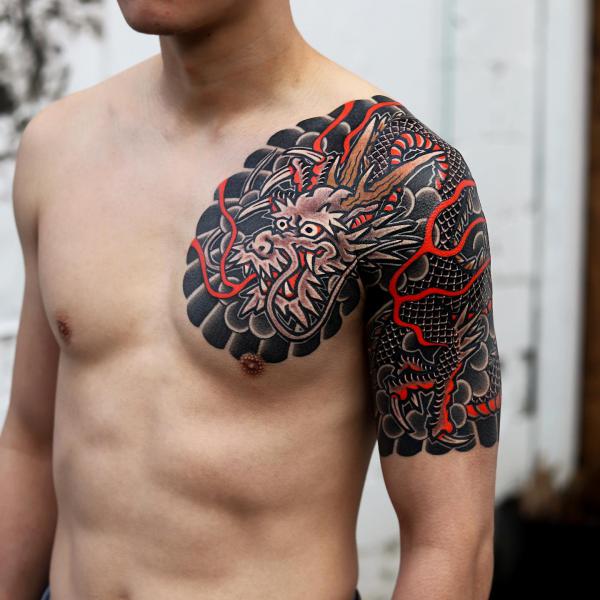
The chest panel is another excellent spot for a Japanese dragon tattoo. The design can spread across the chest to quarter sleeve tattoo, creating a visually stunning and highly visible effect. This design is perfect for those who wish to make a bold statement with their body art.
Japanese water dragon sleeve tattoo
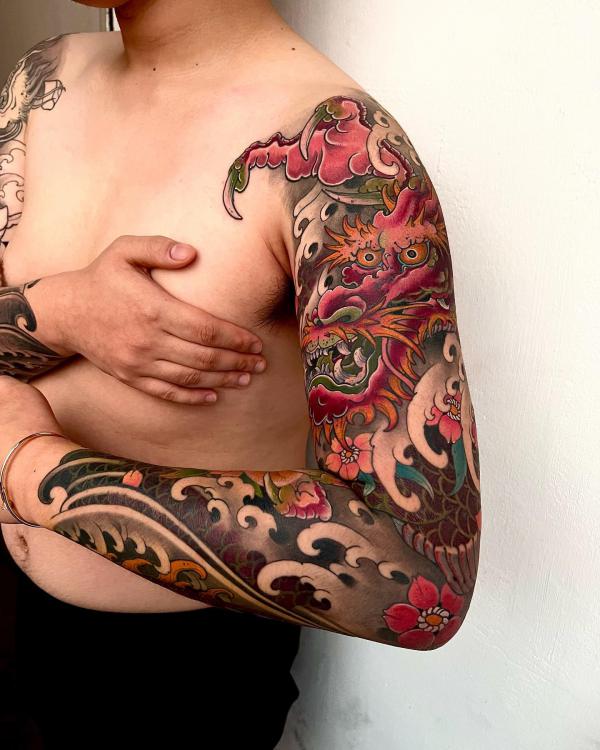
The water dragon, known as Ryu in Japanese culture, is a popular choice for sleeve tattoos. This design features the dragon emerging from or entwined with water, a symbol of life and fluidity. The Japanese water dragon sleeve tattoo is a dynamic design full of movement, perfect for those who want a tattoo that’s alive with energy and meaning.
Black and white Japanese dragon chest and arm tattoo
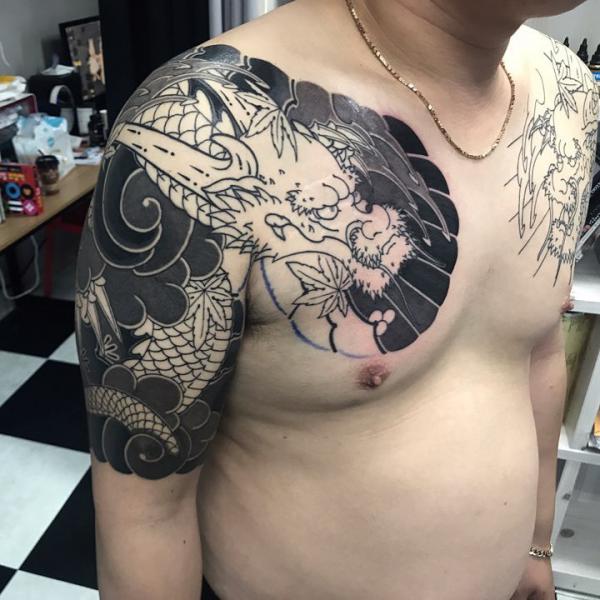
This is an intricate, monochrome Japanese dragon tattoo, extending from the chest to the arm. It showcases the fierce beauty of the mythical creature with a striking black and white contrast, embodying both power and elegance.
Japanese red dragon sleeve tattoo
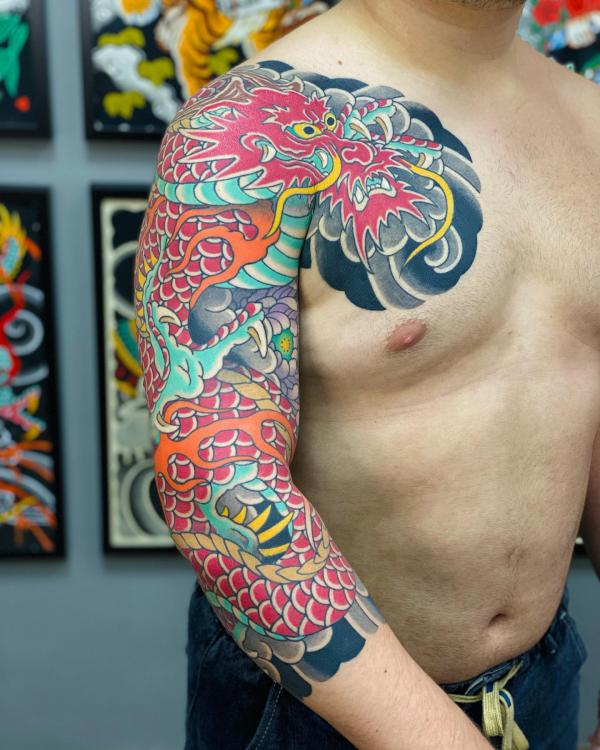
Green Japanese dragon tattoo
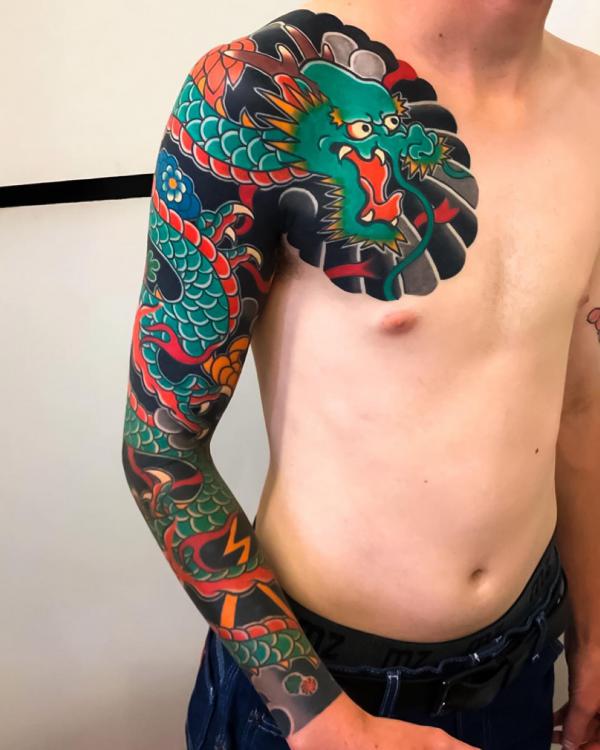
Dragon and peony
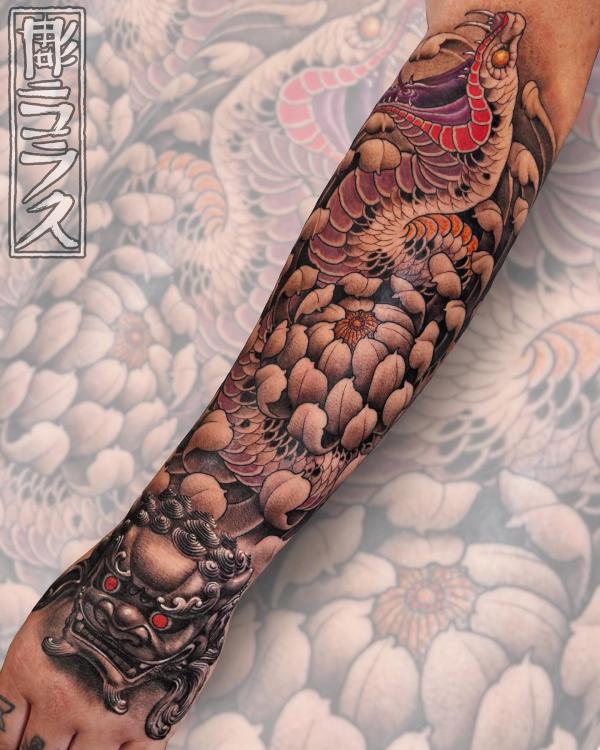
Full sleeve tattoo
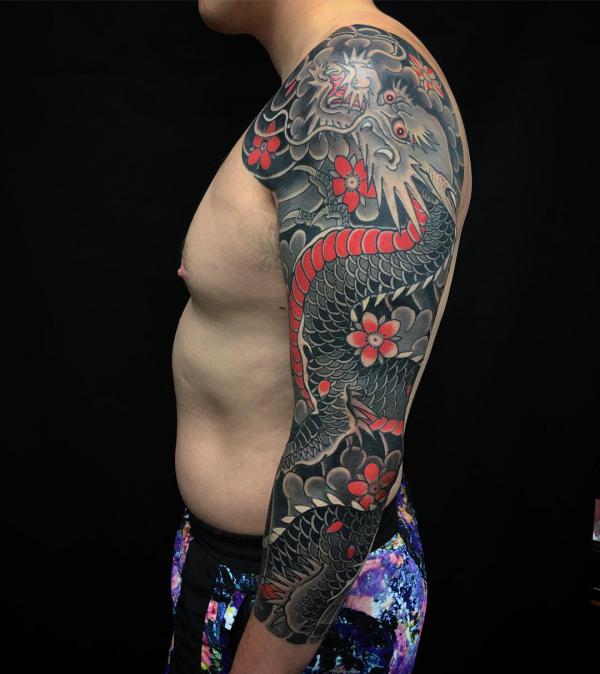
Japanese green dragon chest to arm tattoo
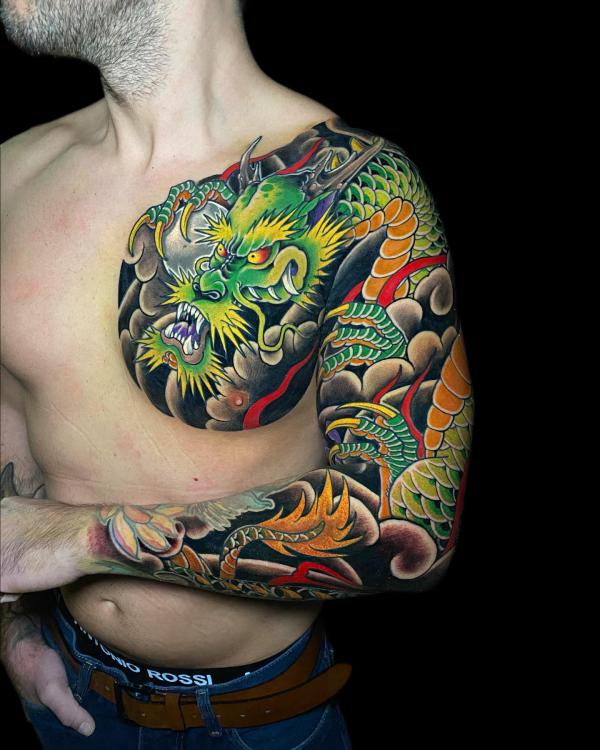
Koi Fish Design
Koi fish are symbols of perseverance and bravery. The legend of the koi fish turning into a dragon after swimming upstream serves as a powerful metaphor for overcoming adversity. A koi fish sleeve tattoo could signify the wearer’s personal struggle and triumph over challenges.
Japanese kio fish and flower sleeve tattoo for women
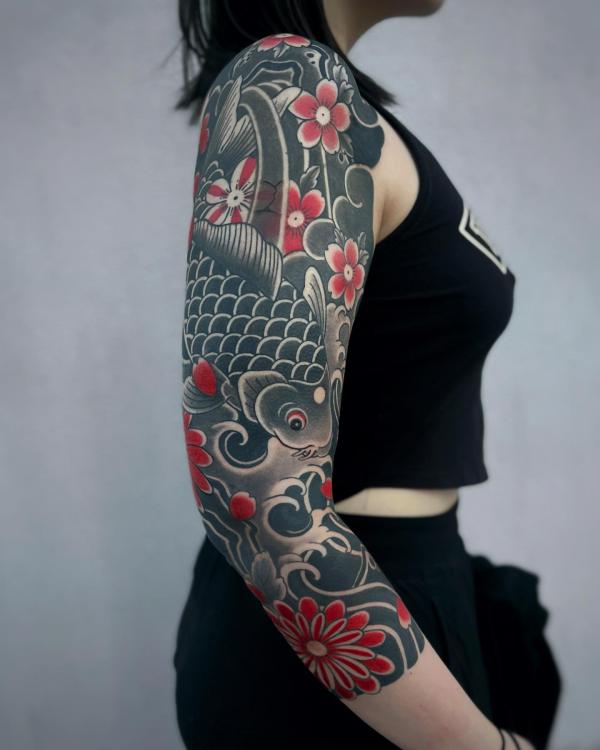
Traditional Japanese Koi Fish and Chrysanthemum Tattoo
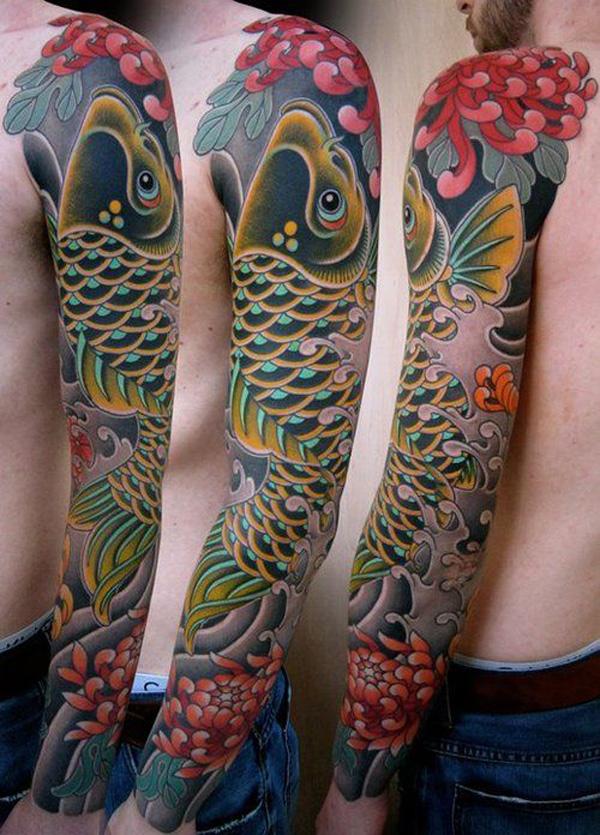
The traditional Japanese koi fish is a popular symbol of perseverance, strength, and good fortune. Paired with the chrysanthemum, this full sleeve tattoo can represent the harmony between two powerful forces. The intricate detail of the koi fish swimming through a sea of chrysanthemum petals creates a visually impactful design that embodies resilience and balance.
Japanese dragon and koi fish sleeve tattoo
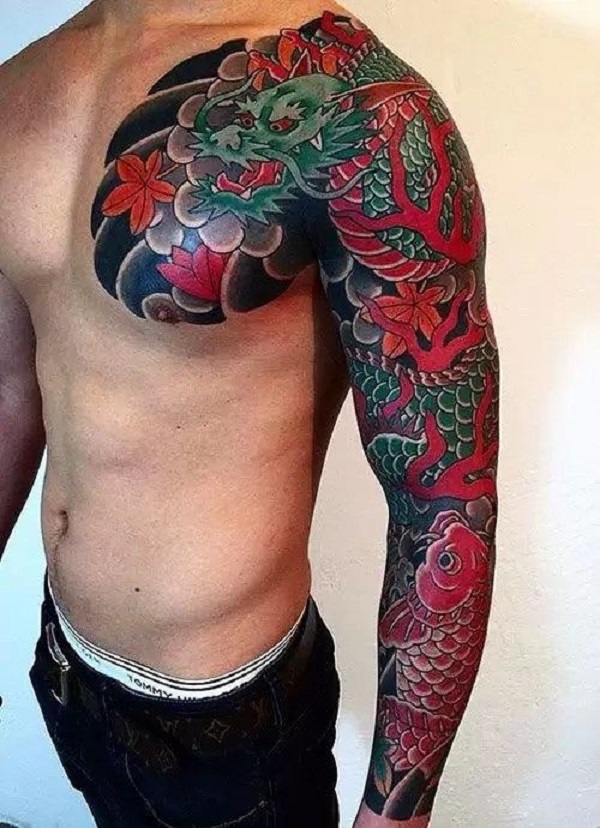
Warrior Design
Warriors, often depicted as Samurai, are popular in Japanese sleeve tattoo designs. They symbolize bravery, honor, and strength. A warrior sleeve tattoo could represent the wearer’s inner warrior or their commitment to living by a code of honor.
Japanese Samurai tattoo
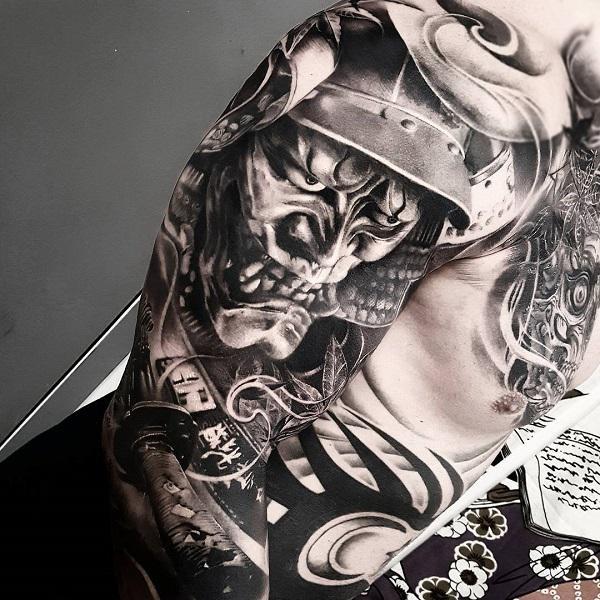
Black and white Japanese Samurai Tiger Tattoo
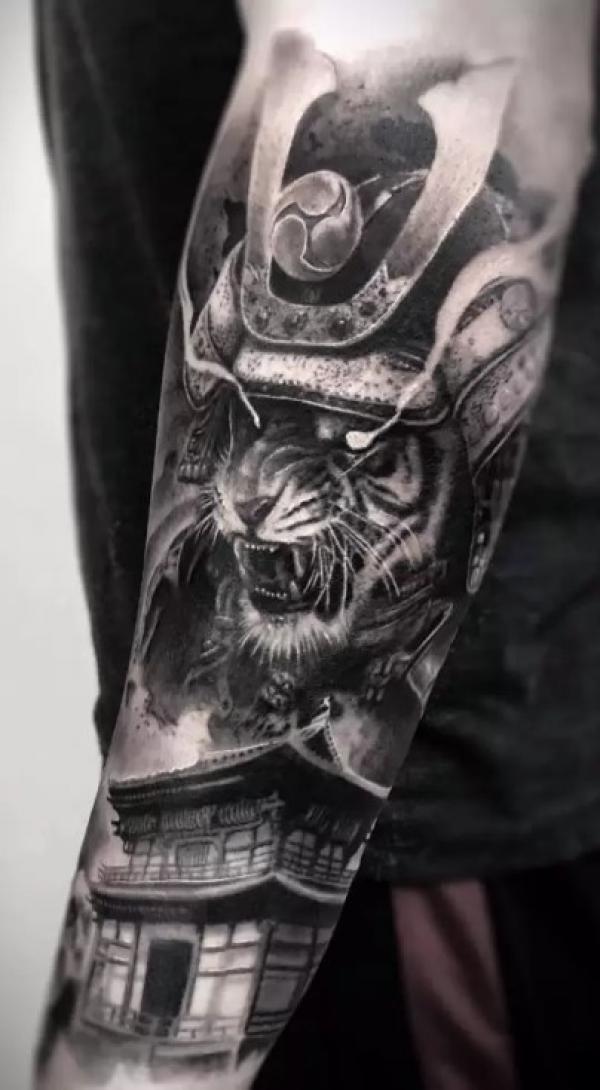
A black and white Samurai tiger tattoo is a dramatic and visually striking design. The monochrome palette adds a timeless quality to the design, while the Samurai tiger stands as a symbol of honor, courage, and discipline.
Phoenix Design
The phoenix, a mythical bird known for bursting into flames and being reborn from the ashes, symbolizes rebirth and triumph over adversity. A phoenix sleeve tattoo can represent a significant transformation or a new beginning in the wearer’s life.
Japanese fullsleeve tattoo with phoenix in black and white style
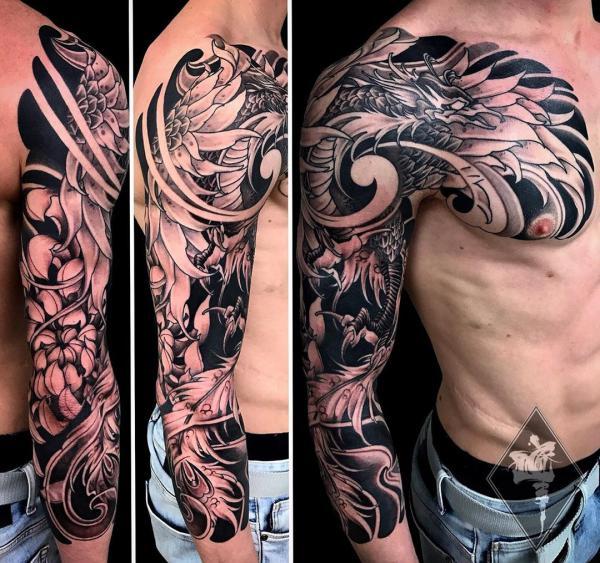
Tiger Design
In Japanese culture, tigers are considered protectors and symbols of courage and strength. They are often depicted surrounded by bamboo and clouds. A tiger sleeve tattoo might signify the wearer’s courage or their role as a protector.
Byakko half sleeve tattoo
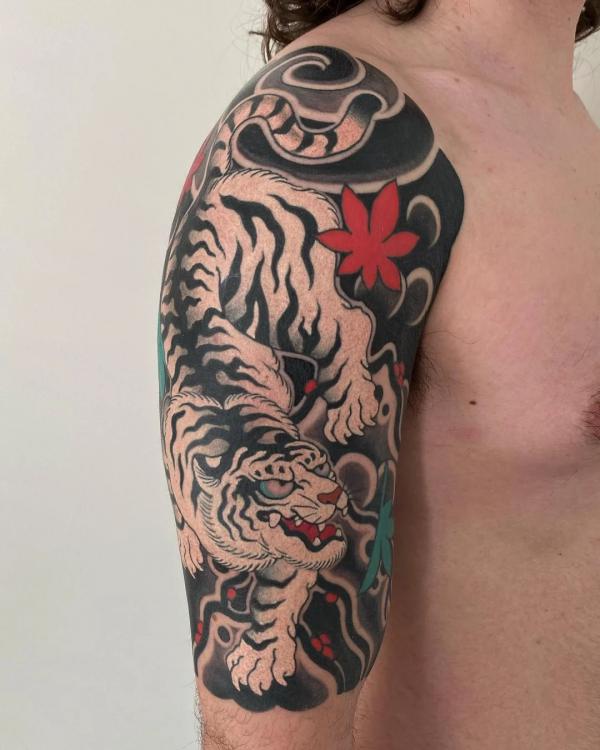
Japanese white tiger and Samurai sword
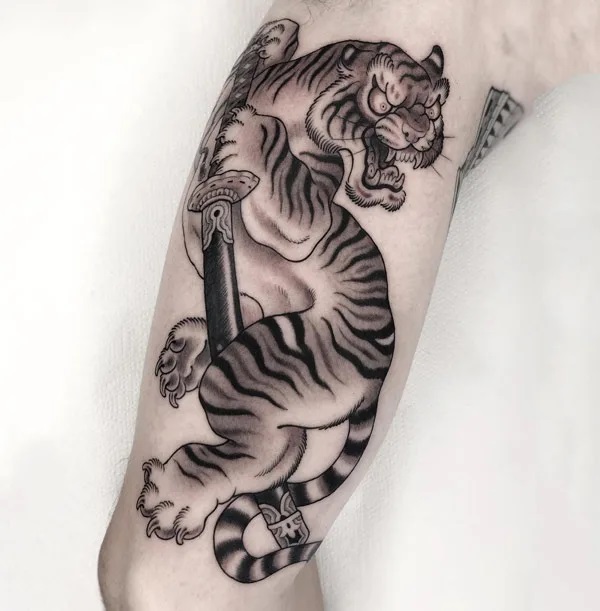
White tiger and waves
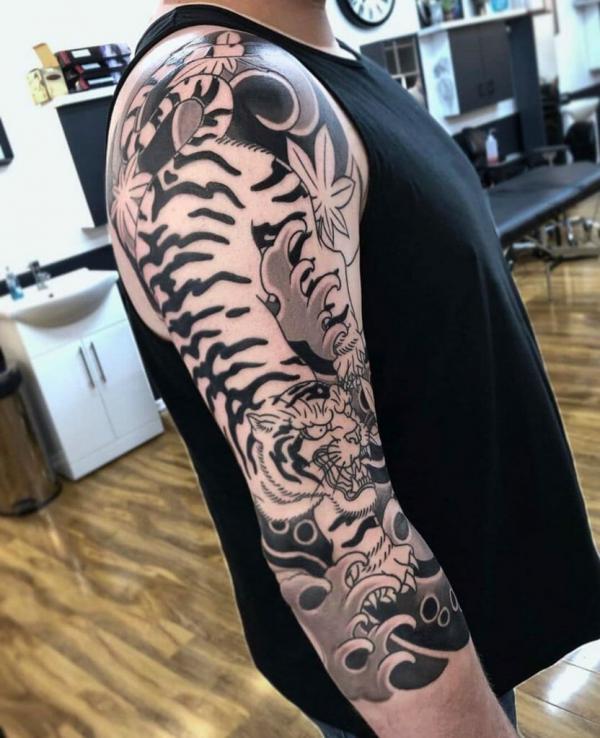
Yellow tiger and red peonies
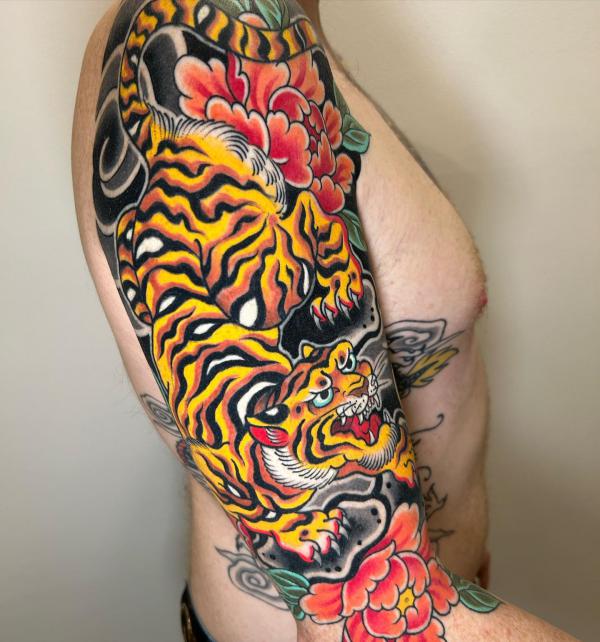
Pink flowers and Yellow tiger
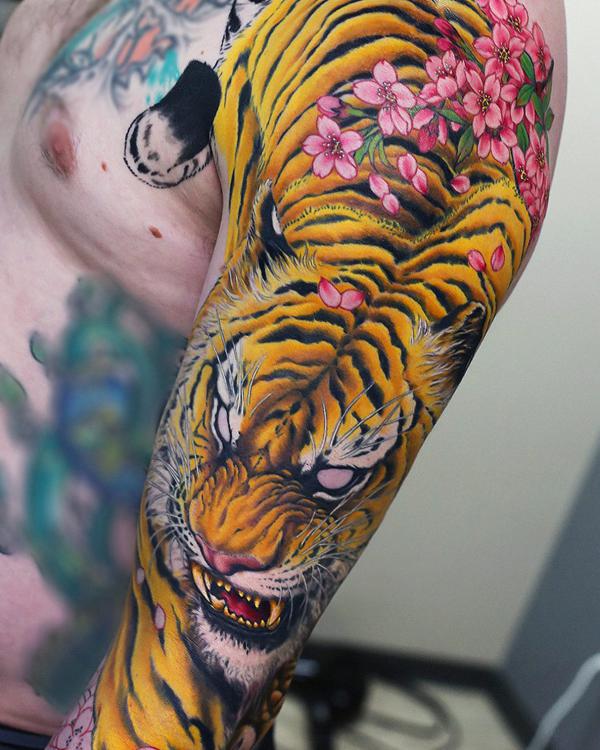
Japanese tiger full sleeve tattoo
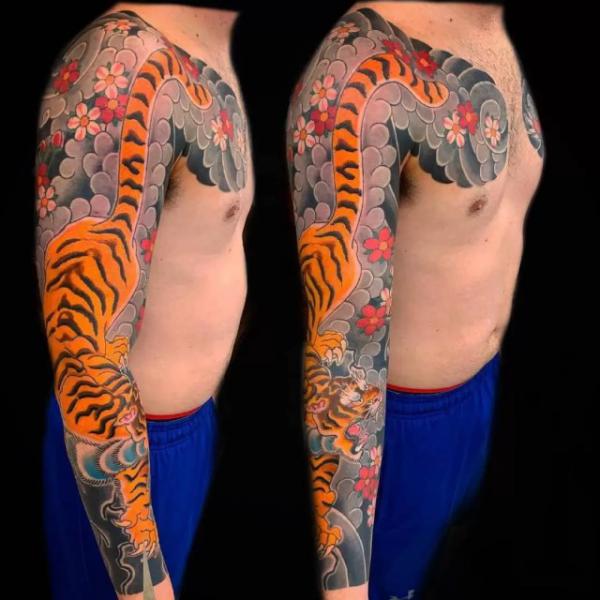
Celestial tiger and cityscape with berry blossoms
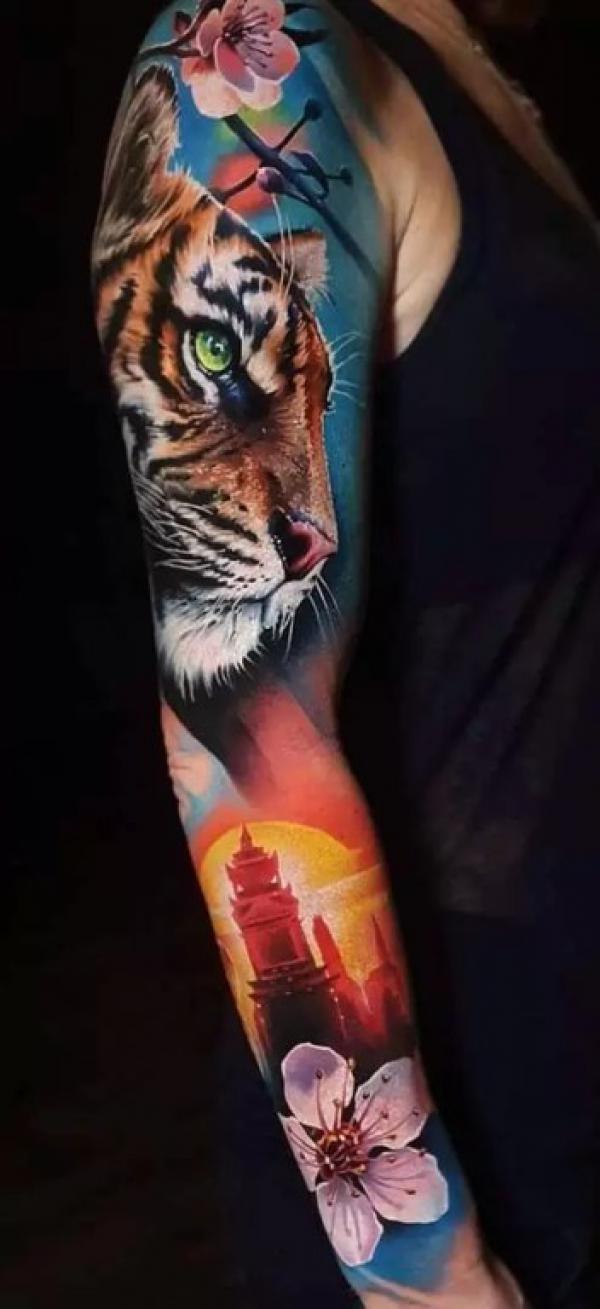
Japanese chrysanthemum and tiger head
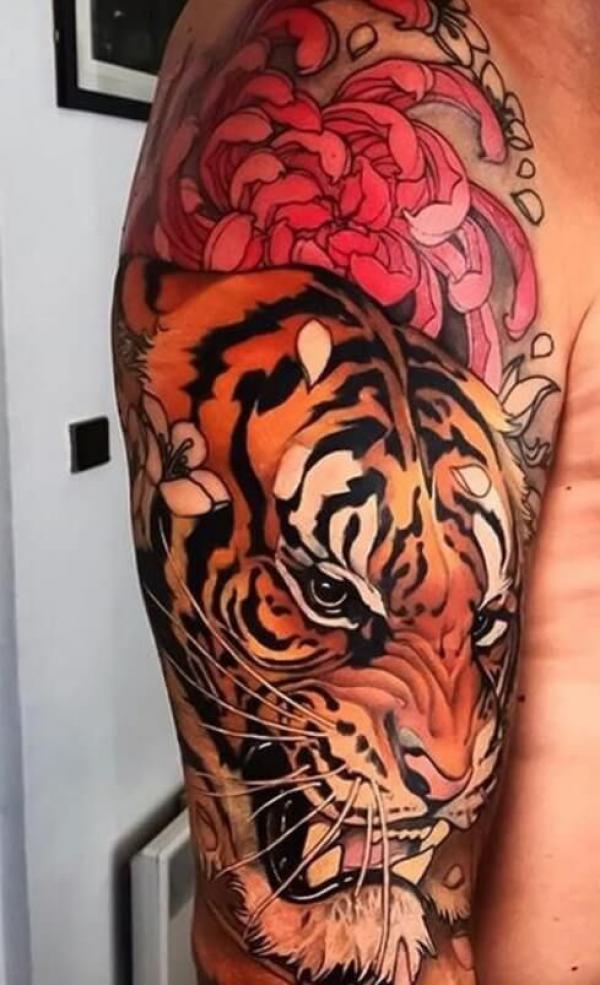
In Japan, the chrysanthemum is more than just a flower; it is a respected emblem of longevity and rejuvenation. A Japanese chrysanthemum tattoo gains an even deeper symbolism when combined with the image of a tiger’s head. The fierce, powerful tiger and the vibrant, everlasting chrysanthemum create a captivating dichotomy, making for a visually dynamic and symbolically rich tattoo design.
Japanese tiger and flowers tattoo
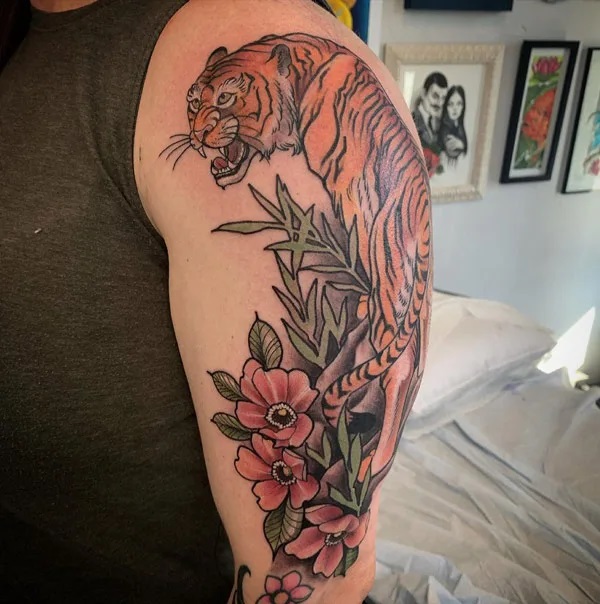
Combining the tiger with various flowers allows for a multitude of interpretations, each flower carrying its unique symbolism. Whether it’s the cherry blossom signifying the transient nature of life or the lotus symbolizing purity and spiritual awakening, this design offers a beautiful blend of strength and elegance.
Japanese tiger and wave tattoo
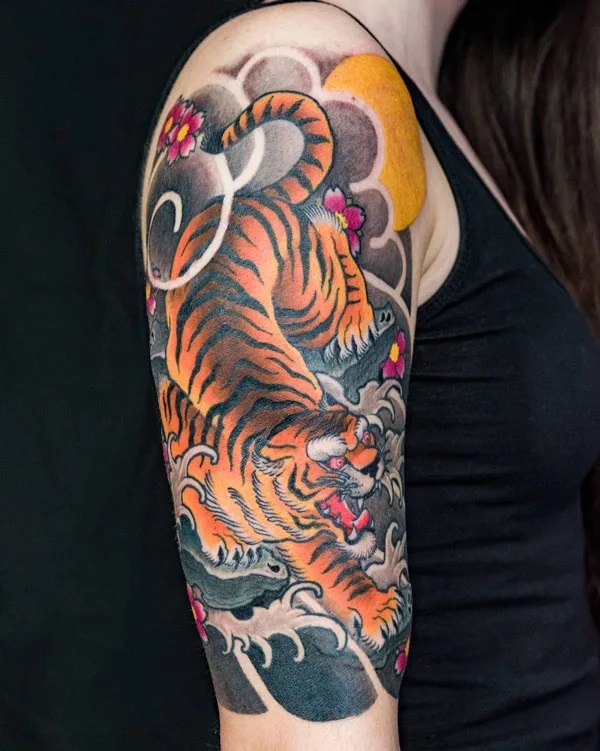
The combination of the tiger and wave is a classic in Japanese tattooing. The wave, a symbol of life’s changes and unpredictability, pairs well with the tiger, a symbol of strength and courage, to represent resilience in the face of life’s tumultuous journey.
Japanese tiger head and claw
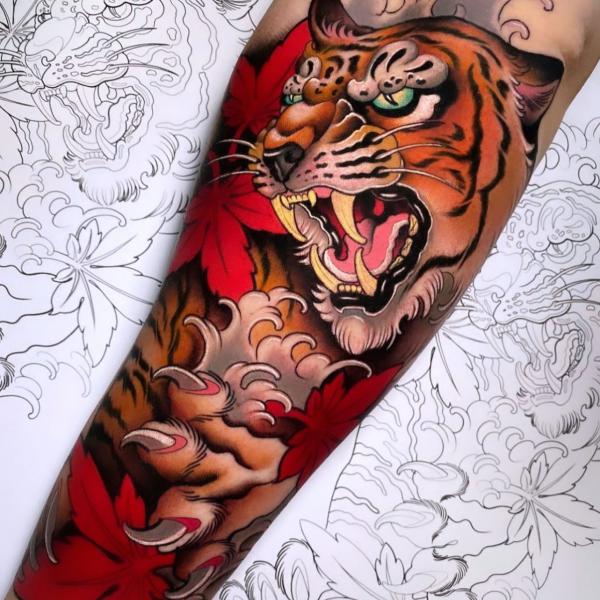
A design featuring a tiger head and claw is a bold and straightforward representation of raw power, courage, and ferocity, encapsulating the very essence of the tiger.
Japanese tiger head embraced by petals of chrysanthemum
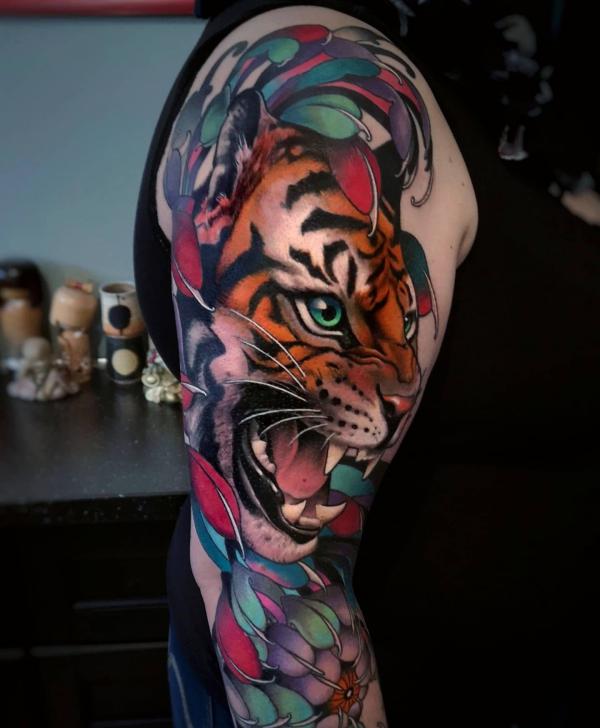
This design marries the ferocity of the tiger with the longevity of the chrysanthemum. The chrysanthemum petals embracing the tiger head can symbolize the balance between power and elegance, or the intertwining of strength and eternal beauty.
Tiger and lily
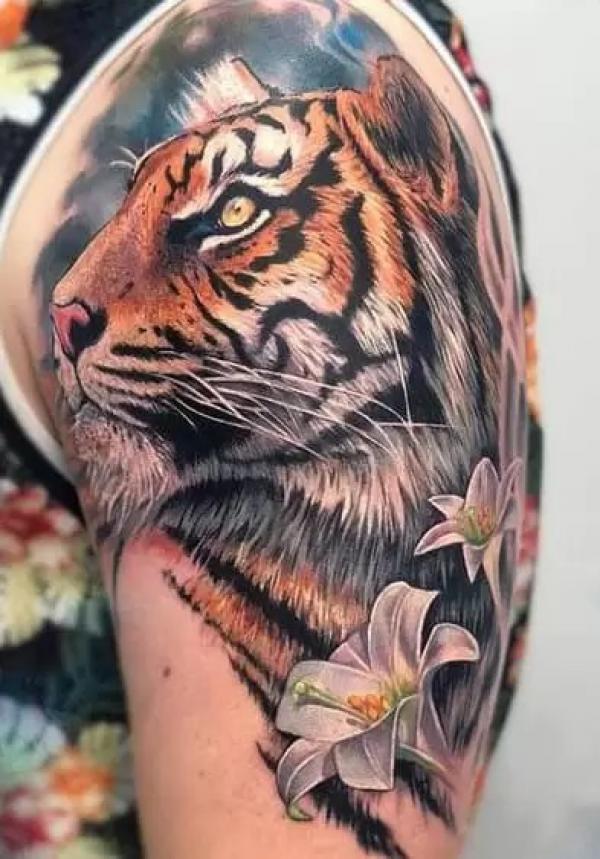
The lily, a flower known for its beauty and purity, makes for a fascinating contrast when paired with the fierce tiger. This design can signify the balance of strength and gentleness, and the coexistence of power and purity.
Tiger head and Hannya full sleeve tattoo for men
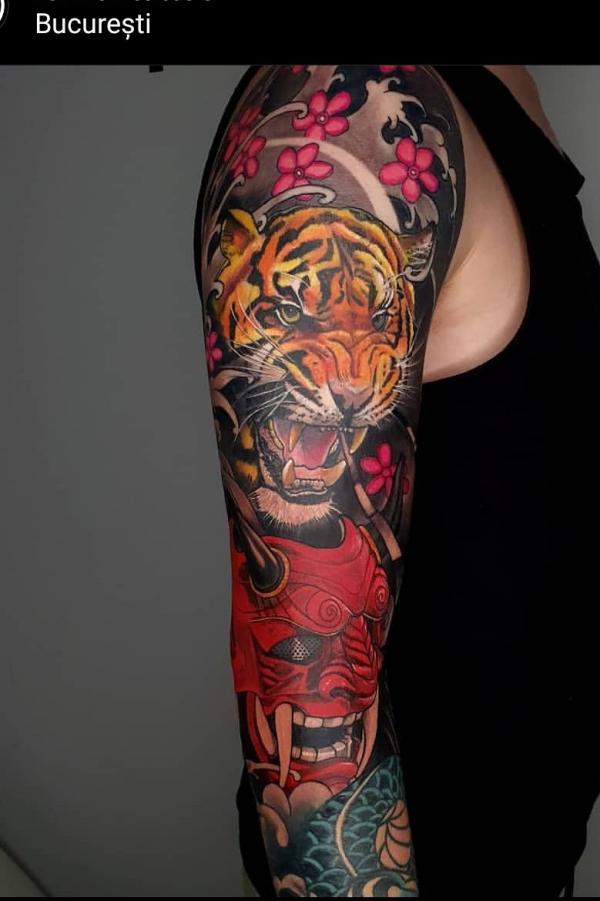
A full sleeve tattoo featuring a tiger head and Hannya mask is a dramatic and elaborate choice. The fierce tiger and the Hannya mask, representing a woman transformed into a demon by intense emotion, create a compelling narrative of passion, power, and transformation.
Tiger head embrace with chrysanthemum
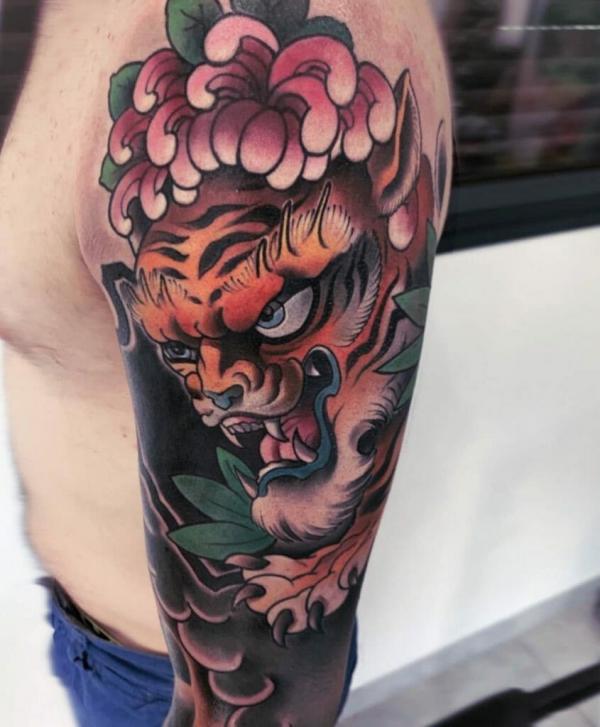
A design featuring a tiger head embraced by chrysanthemums combines the tiger’s strength and the chrysanthemum’s longevity. This design can symbolize the intertwining of power and eternal beauty, or the harmony between strength and elegance.
Black and white Japanese tiger tattoo
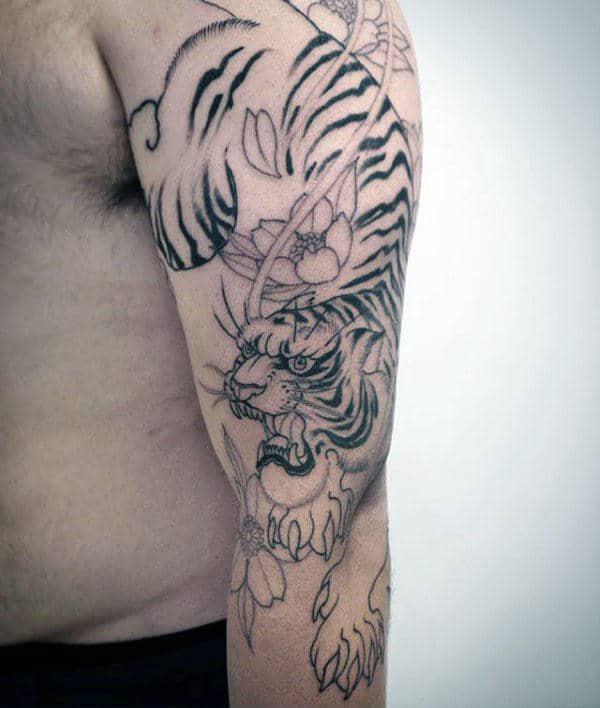
A black and white Japanese tiger tattoo is a classic choice, offering a timeless representation of strength and courage. The monochrome design adds a sense of depth and intensity to the powerful figure of the tiger.
Oni (Demon) Design
Japanese folklore often depicts Oni, or demons, as fearsome, troll-like creatures. They are symbols of protection from evil, disease, and other harmful influences. An Oni sleeve tattoo could represent the wearer’s struggle against personal demons or their role as a protector.
Japanese Oni and snake tattoo
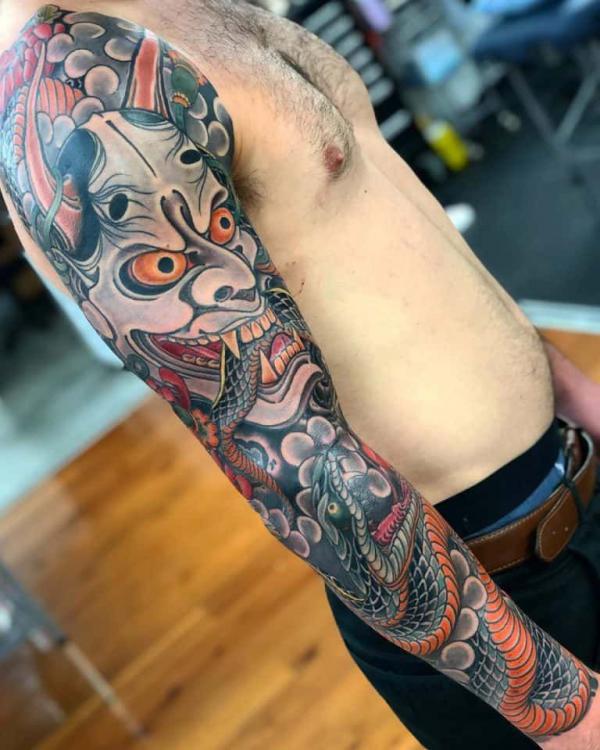
Japanese Oni Mask
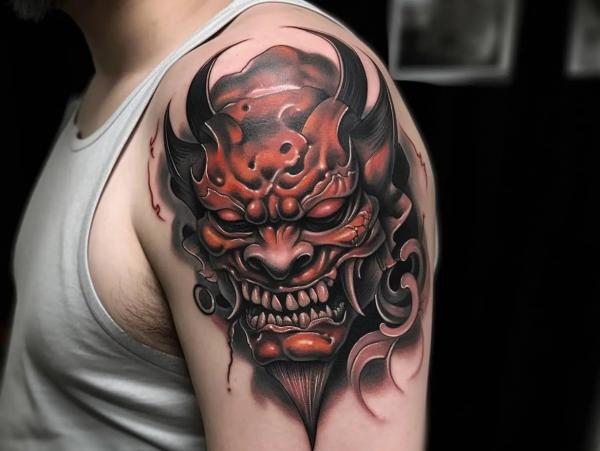
Foo Dog Design
Foo Dogs, or lion dogs, are mythical beasts and protectors against evil spirits in Japanese mythology. A Foo Dog sleeve tattoo might represent protection and security, warding off evil spirits and negativity.
Japanese Foo Dog sleeve tattoo
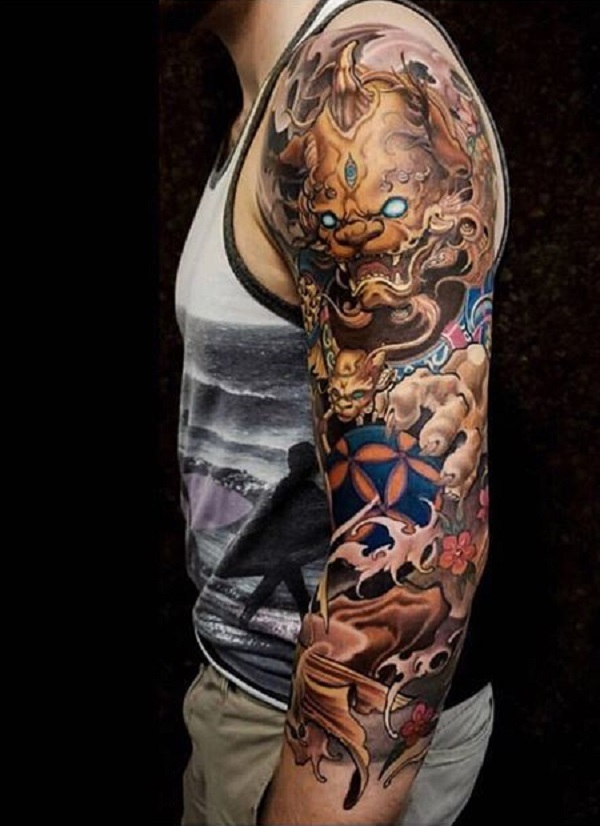
Traditional Foo Dog
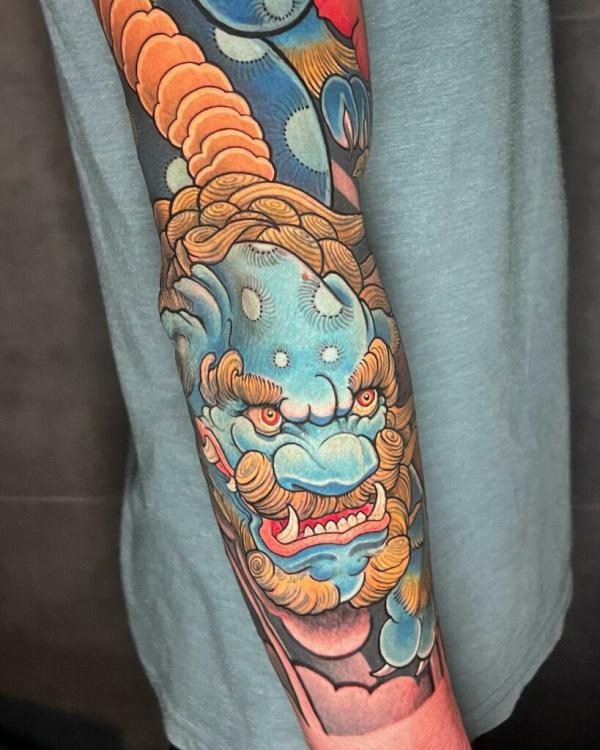
Foo Dog and peony
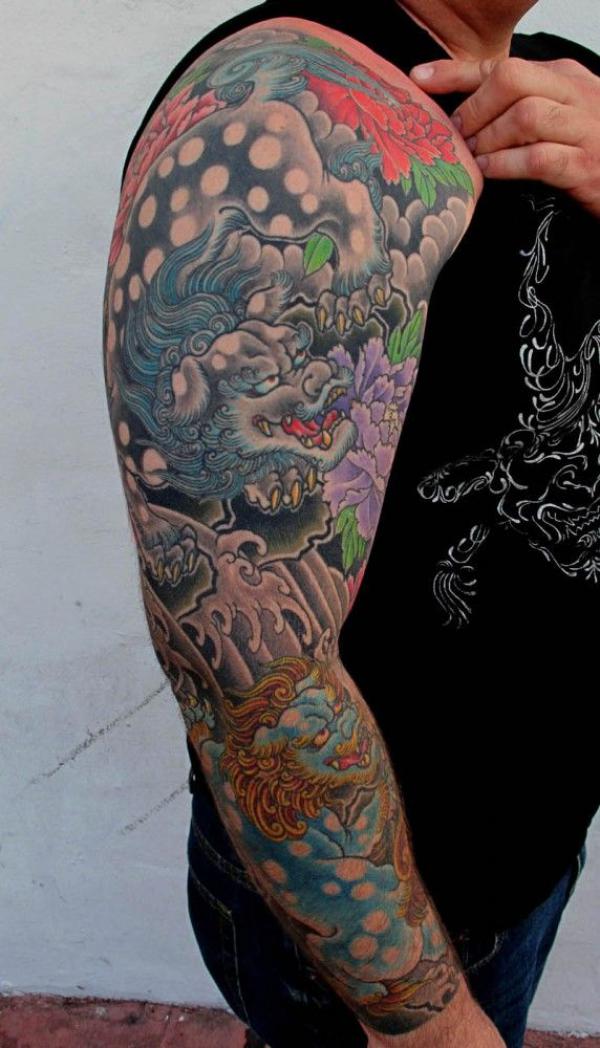
Samurai Design
Japanese culture reveres Samurai for their loyalty, courage, and strict adherence to the bushido code. A Samurai sleeve tattoo can symbolize honor, bravery, and a dedication to living a principled life.
Fallen e Samurai sleeve tattoo
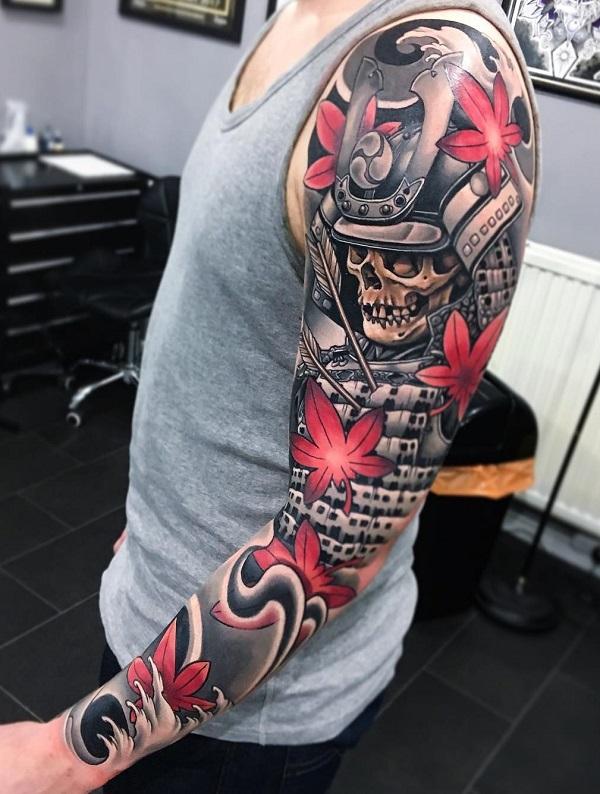
Sakura Tree Design
The Sakura tree, or cherry blossom tree, stands for the fleeting nature of life due to the brief blooming period of the blossoms. A Sakura tree sleeve tattoo can symbolize an appreciation for the transient nature of life and the beauty that comes with it.
Sakura Tree of life with clock
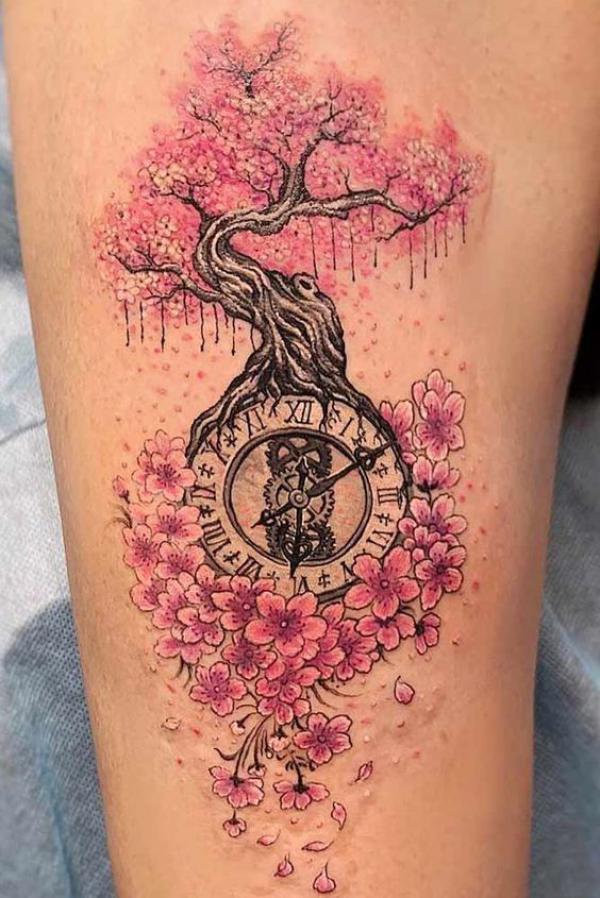
Sakura cherry blossoms
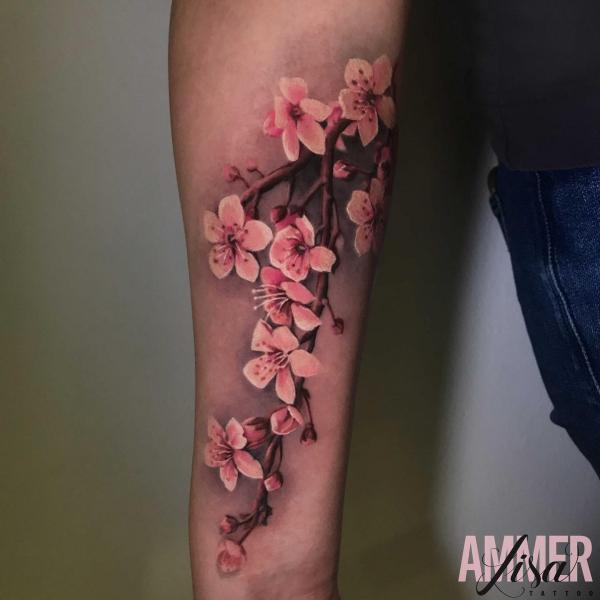
Geisha Design
Geishas are traditional Japanese female entertainers who are skilled in various Japanese arts like classical music and dance. In the tattoo world, Geishas often symbolize beauty, mystery, elegance, and allure. They can also symbolize the struggle of women in society, as Geishas were often seen as women who sacrificed their personal lives for their art. Sleeve tattoos featuring Geishas often incorporate other elements of Japanese culture, such as cherry blossoms or lanterns.
Black and white geisha tattoo on forearm
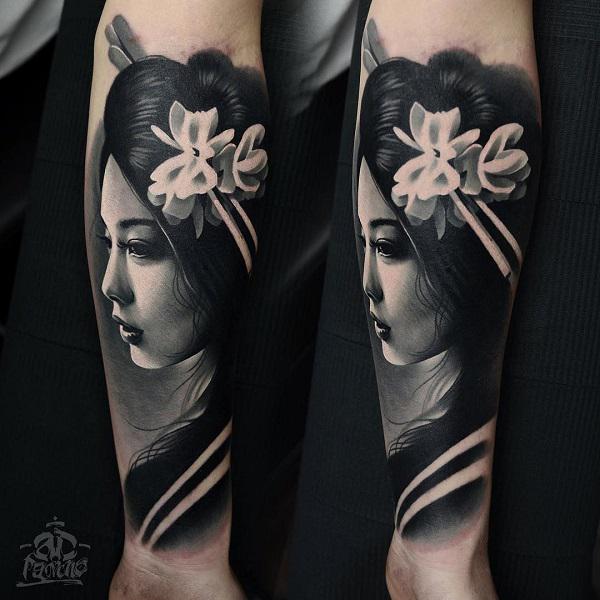
Hannya Mask Design
The Hannya mask is a popular image in Noh and Kyogen, traditional Japanese theater. It represents a woman who has been consumed by jealousy and transformed into a demon. As a tattoo, the Hannya mask can symbolize the complexity of human emotions and the transformation that can happen when those emotions become overwhelming. It’s a powerful image, often used in larger pieces, with flames and other dramatic elements to enhance its impact.
Japanese Hannya mask embraced by petals of chrysanthemum
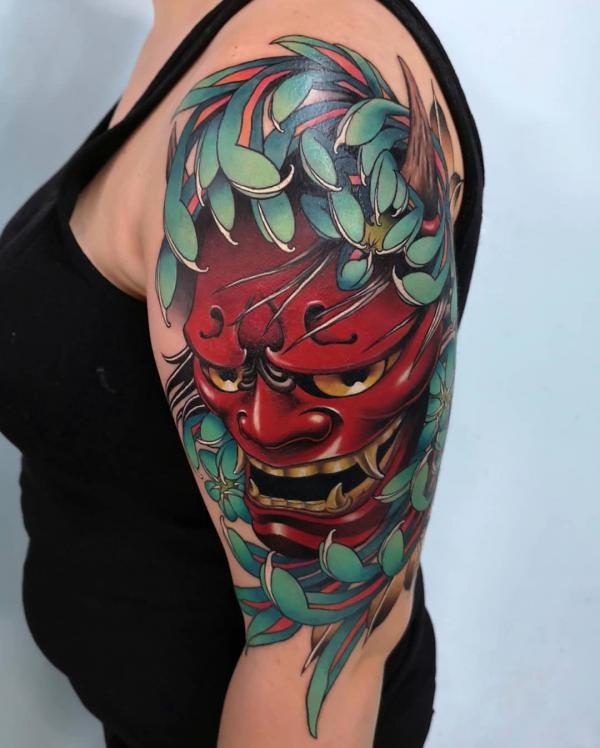
A Japanese hannya mask embraced by the petals of a chrysanthemum can create a visually stunning and contrasting design. The hannya mask’s sinister expression is offset by the beautiful chrysanthemum petals, illustrating the balance between darkness and light. This tattoo can symbolize the duality of human nature and the need for harmony within oneself.
Lotus Flower tattoos
The lotus flower holds a significant place in Buddhist philosophy and is seen as a symbol of purity, enlightenment, and rebirth. Its ability to bloom in muddy waters is seen as a metaphor for overcoming adversity and achieving a state of serenity. Japanese sleeve tattoos featuring the lotus flower can signify a person’s journey towards enlightenment or a symbol of overcoming personal challenges.
Red Lotus sleeve tattoo
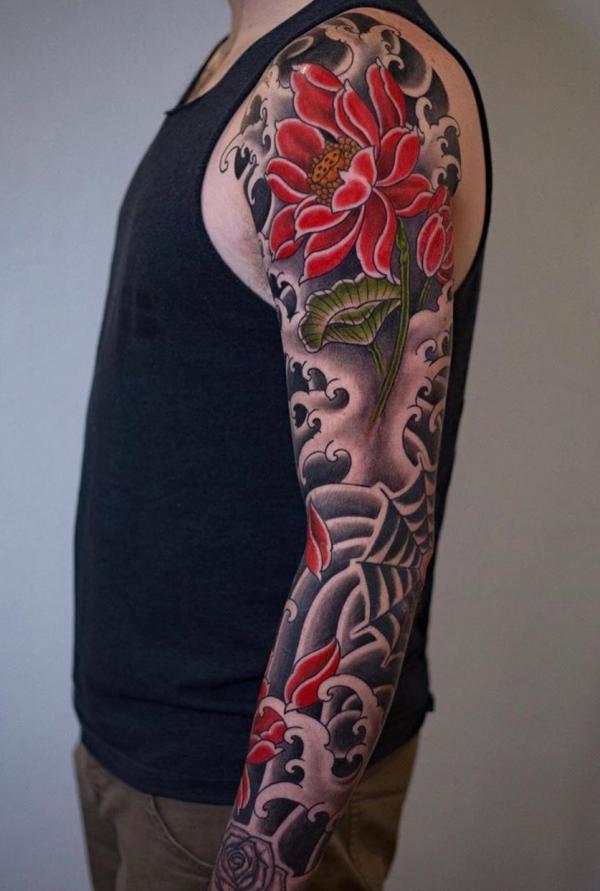
Japanese Lotus bicep tattoo
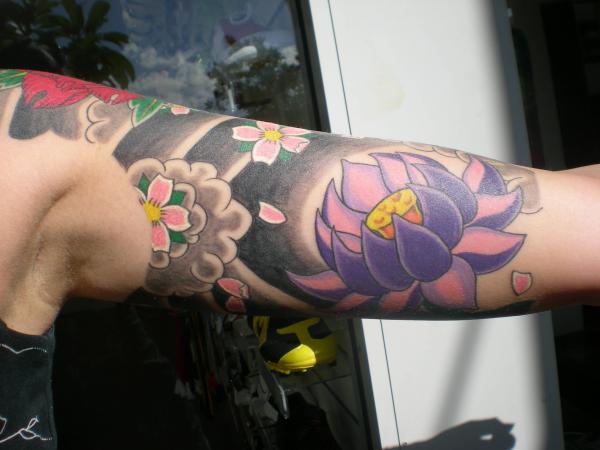
Snake Design
In Japanese culture, snakes (Hebi) are associated with both good and evil connotations. They are often regarded as guardians and protectors, warding off illness and misfortune. On the other hand, they can also symbolize temptation and the dangerous allure of the forbidden. A Japanese snake tattoo can represent protection, wisdom, and transformation, but it can also represent a person’s struggle with temptation.
Japanese snake with Chrysanthemum forearm tattoo
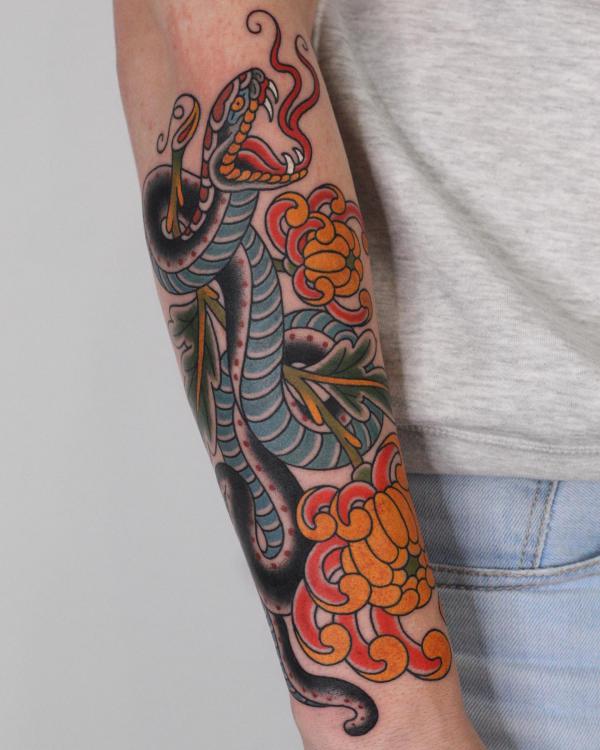
The forearm tattoo features a Japanese snake with a chrysanthemum, creating an eye-catching and symbolic design. The snake represents transformation, wisdom, and rebirth, while the chrysanthemum symbolizes purity and balance. This visually striking tattoo is a great choice for those looking for a unique and meaningful design that showcases the beauty of traditional Japanese tattoo art.
Snake and chrysanthemum
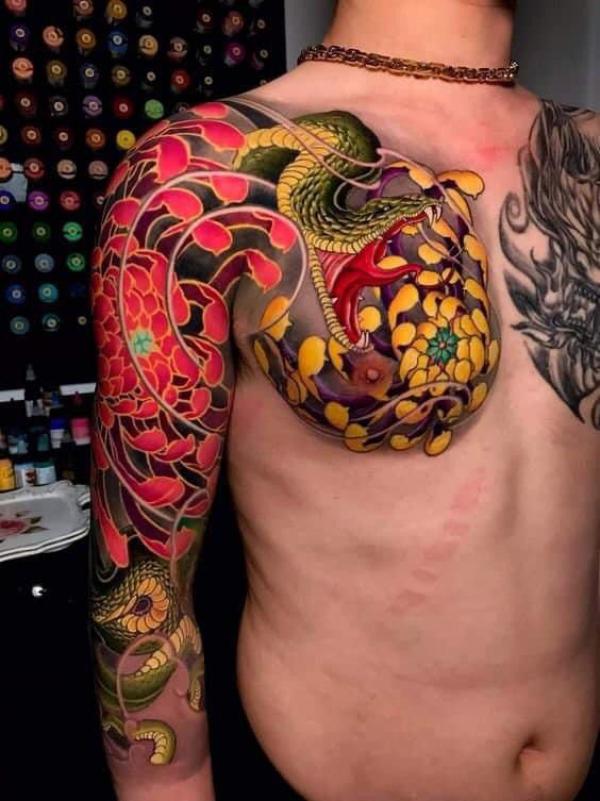
The tattoo that combines a snake and chrysanthemum creates a visually captivating and symbolic design. The snake represents transformation, wisdom, and rebirth, while the chrysanthemum symbolizes purity and balance. This powerful tattoo is an excellent choice for those looking to showcase the duality of nature and the harmony between contrasting forces.
Wave Design
Japanese wave tattoos are inspired by traditional Japanese art, particularly the woodblock prints of artists like Hokusai. Waves symbolize the strength and power of nature, the rhythm of life, and movement. They can also represent obstacles to overcome, as navigating through waves is often seen as a metaphor for tackling life’s challenges. Japanese wave sleeve tattoos generally employ a high level of detail and often incorporate other elements such as Koi fish or dragons.
Japanese wave and cloud full sleeve tattoo
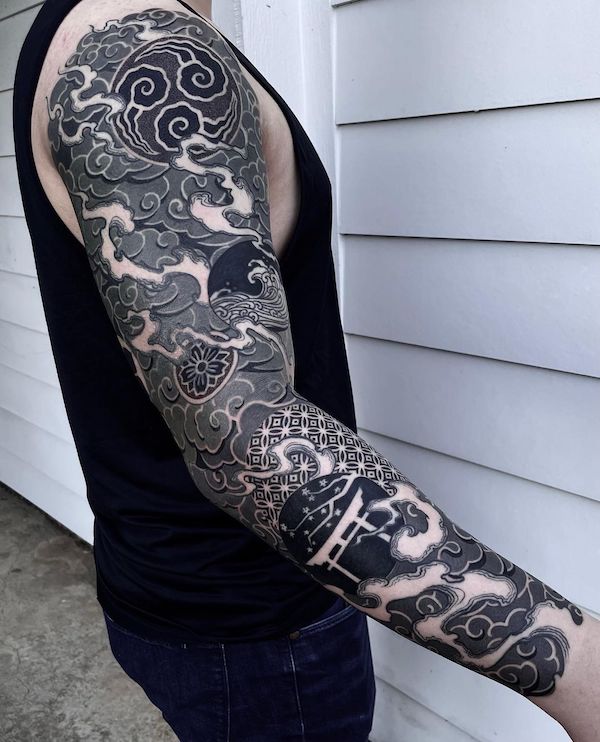
Wave and cloud tattoo in Japanese style on full arm for women

Crane Design
Cranes are revered in Japanese culture for their beauty and longevity. They are often associated with good fortune, longevity, and loyalty. In fact, it’s believed that folding 1,000 origami cranes can make a person’s wish come true. A crane sleeve tattoo can symbolize a long life, prosperity, and good health. They are often depicted in a serene, tranquil setting, adding an element of peace and calm to the tattoo.
Japanese crane and chrysanthemum under the sun
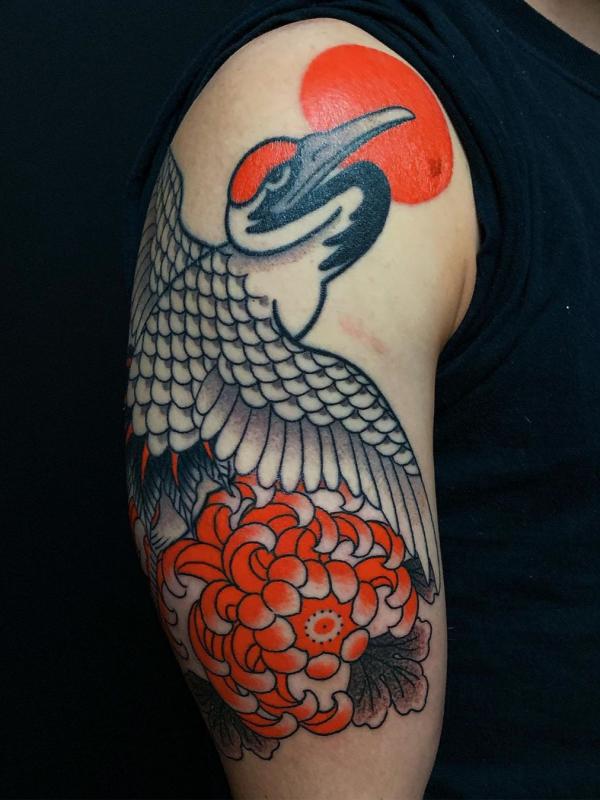
The Japanese crane is a symbol of good fortune, longevity, and loyalty. A tattoo featuring a crane and chrysanthemum set against the backdrop of a rising sun can create a stunning and inspirational design. The crane can be depicted gracefully flying through the sky, surrounded by chrysanthemum petals, symbolizing the harmony between the natural world and the human spirit.
Chrysanthemum Design
The chrysanthemum, or “kiku,” is a symbol of the emperor and the Imperial family in Japan, and it represents nobility, perfection, and rejuvenation. In tattoo art, the chrysanthemum is a symbol of determination, a long life, and a positive transition in the future. These tattoos are often combined with other elements of Japanese culture, such as dragons, tigers, or samurai, to create a dynamic, engaging image.
Chrysanthemum wave full sleeve tattoo
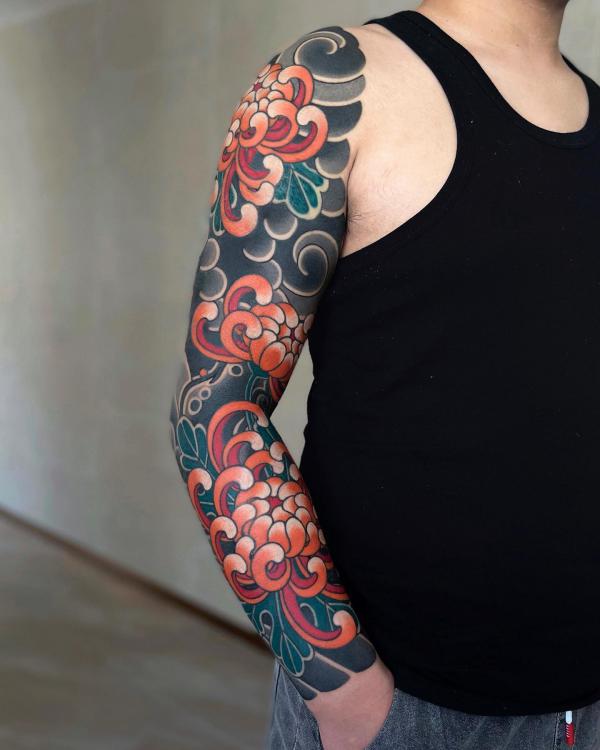
This full sleeve tattoo features red and white chrysanthemums on the backdrop of black waves. The waves represent strength and movement, while the chrysanthemums symbolize harmony and balance. This visually captivating tattoo is an excellent choice for those seeking a unique and meaningful design that showcases the beauty of traditional Japanese tattoo art.
Chrysanthemum and dragon
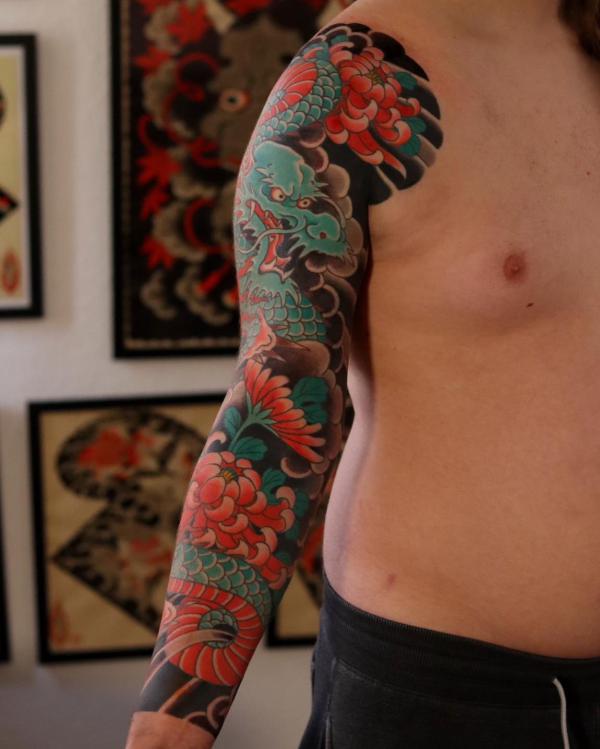
This full sleeve tattoo features a Japanese dragon intertwined with chrysanthemum flowers. The dragon, a symbol of strength, wisdom, and protection, weaves its way through the delicate chrysanthemum petals, illustrating the balance between fierceness and elegance. This visually impactful tattoo is perfect for those seeking a bold and meaningful design.
Chrysanthemum blackout tattoo
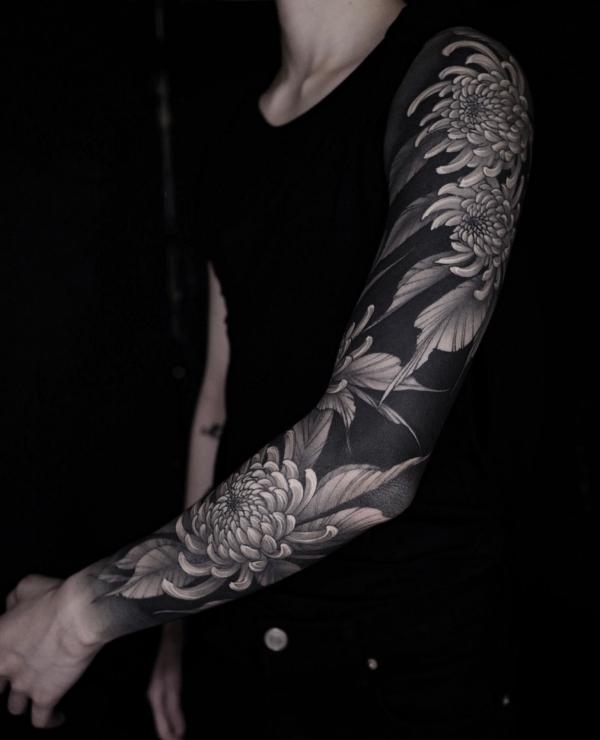
A chrysanthemum blackout tattoo is a unique and striking choice for those who want a different take on this classic symbol. The negative space chrysanthemum is created on a black background, emphasizing the intricate detail and delicate beauty of the flower. This tattoo is an excellent option for those looking to make a statement with their body art while honoring the traditional Japanese chrysanthemum.
The Making of a Masterpiece: Getting a Japanese Sleeve Tattoo
The process of getting a Japanese sleeve tattoo is a journey of patience and resilience. It begins with choosing a design that resonates with your personal beliefs or experiences, followed by finding an artist experienced in Japanese tattooing. This is crucial as the artist must understand the cultural nuances and symbolism within the designs.
Once you have a design and an artist, the inking process begins. Depending on the complexity of the design, a full sleeve can take anywhere from 10 to 50 hours, divided into multiple sessions. The process can be painful, but the end result, a stunning piece of art etched into your skin, makes it worthwhile.
Ensuring the Art Endures: Aftercare and Maintenance
Proper aftercare is essential for the longevity of your tattoo. This includes keeping the tattoo clean, avoiding sun exposure, and regularly moisturizing the area. Touch-ups may be necessary over time to keep the colors vibrant and the lines sharp.
Shifting Tides: Modern Perception of Japanese Sleeve Tattoos
The perception of Japanese tattoos has significantly evolved, especially in the western world. What was once associated with criminality is now seen as a form of self-expression and art. Japanese sleeve tattoos, with their intricate designs and profound symbolism, have become a popular choice among tattoo enthusiasts worldwide.
In conclusion, Japanese sleeve tattoos are more than just body art. They are a reflection of personal stories, life philosophies, and cultural heritage. As with any tattoo, a Japanese sleeve tattoo should be chosen with care, not just for its aesthetic appeal, but for the deep meanings and cultural significance it holds.


